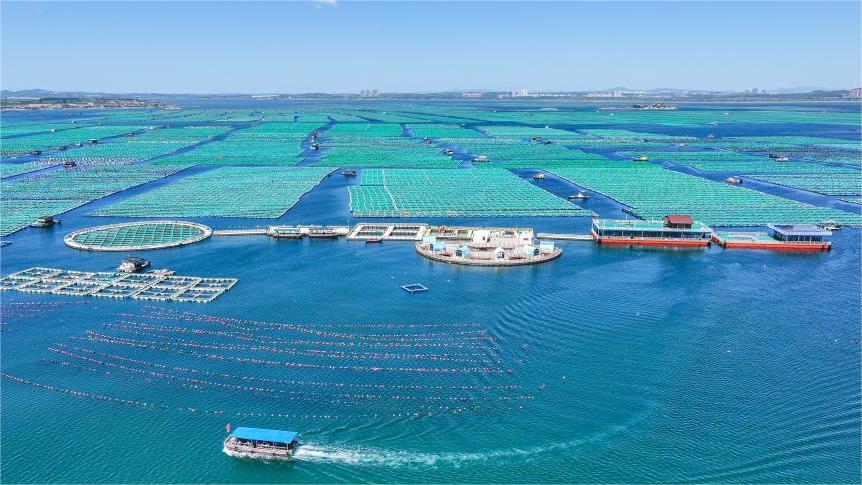America's additional levy on Chinese products "bad policy, worse leadership"
BEIJING, May 17 (Xinhua) -- The White House on Tuesday imposed new tariffs on Chinese products including electric vehicles (EVs), and the protectionist move has been widely criticized as a bad policy that is counterproductive to the economy and detrimental to global environmental ambitions.
The additional levy hiked tariffs on Chinese EV imports from 25 to 100 percent. A variety of other imports from China, including lithium batteries, photovoltaic cells, critical minerals, semiconductors, steel and aluminum, will also be affected.
An article published by The Economist magazine on Thursday called America's move as "bad policy, worse leadership."
The report said that one of the great accomplishments of the past half-century was the remarkable decrease in global tariffs. The reduction, from average levies on imports of more than 10 percent in the 1970s to 3 percent today, helped fuel a boom in international commerce and a near-tripling in global GDP per person.
The more that countries opened up, the more they flourished. So it is deeply regrettable that President Joe Biden has decided to impose tariffs of 100 percent on electric vehicles made in China, it said, adding that the protectionist move will bring "underappreciated economic harms" to America and the world.
A Bloomberg opinion piece said Tuesday that Chinese clean technology is not the enemy. China installed as much wind and solar last year as the rest of the globe combined, and the world need that scale to decarbonize.
If Western countries are truly contemplating green industrial policies that actually build things, rather than just an elaborate set of trade barriers to cut them off from a world that's decarbonizing with Chinese technology, we may finally be making progress, the article read.
Eric Zheng, president of American Chamber of Commerce in Shanghai, said that imposing more tariffs on Chinese imports may have unintended consequences such as putting more pressure on inflation, driving up costs for U.S. businesses and consumers.
"We appreciate the administration's efforts in recent months to stabilize the U.S.-China relationship. We are concerned, however, that this new round of tariffs may lead to another trade war, which would not be in the best interest of either country," Zheng said.
Hu Jie, professor at Shanghai Advanced Institute of Finance, Shanghai JiaoTong University, noted that the new tariffs on Chinese products may impact China's exports, but the policy could have a greater effect on American businesses and consumers.
"The market share of Chinese new energy vehicles in the U.S. is already small, so the impact of tariffs on China is very limited. However, this policy restricts American consumers' choices and prevents them from benefiting from the cost-effective new energy vehicles produced in China," said the scholar.
Bill Russo, founder and CEO of Automobility Limited, a Shanghai-based strategy and investment advisory firm, said that tariff walls do nothing to improve the competitiveness of U.S. domestic carmakers. Worse, it creates a security blanket and extends the life of their gas powered vehicles.
According to Russo, American consumers will end up footing the bill for an inability to access efficient and scaled supply chains from China.
"Markets that use tariff protections are denying consumers access to affordable EVs, thereby limiting consumer acceptance. They will remain stuck in the internal combustion engine age for the foreseeable future," said Russo.
Josef Gregory Mahoney, professor from East China Normal University, said these policies will not help America develop new manufacturing capacities.
"What helped China's EV industry was making it internationally open and competitive. This benefited Tesla immensely, by the way, one of the few American automakers to race towards the future," said Mahoney.
The scholar added that increased costs for solar panels and EVs mean U.S. consumers will find it harder to go green. This will suit Biden's pro-oil policies given his radical expansion of drilling in once-protected Alaskan nature reserves, dealing blows against the global environment.
Photos
Related Stories
- Experts say US forcing nation to hit back
- China's industry, commerce community urges U.S. to stop tariff hike on Chinese goods
- U.S. "going further down wrong path" with tariff hikes: embassy
- U.S. tariff hikes on Chinese products bound to backfire
- Increased tariffs on Chinese products to inflict greater losses on U.S. companies, consumers
Copyright © 2024 People's Daily Online. All Rights Reserved.









